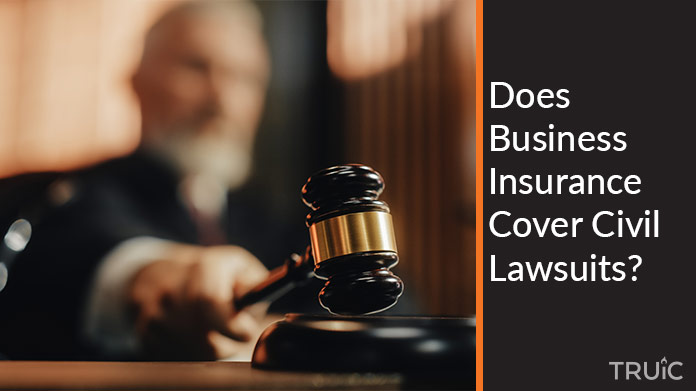Does Business Insurance Cover Civil Lawsuits?
We’ll share which business insurance policies cover civil lawsuits and how they can help protect your business.
Recommended: Next Insurance is dedicated to matching small businesses with the right policies at the best price.

General Liability Insurance for Civil Lawsuits
General liability insurance is a type of insurance that provides coverage for a wide range of risks, including bodily injury, property damage, and advertising injury.
In the event of a civil lawsuit, your general liability insurance may cover the cost of your legal defense and any damages that you are ordered to pay.
For example, a customer could slip and fall in your store and injures themselves. If the customer decides to sue your business for their injuries, your general liability insurance may cover the cost of your legal defense and any damages that you are ordered to pay.
Similarly, if someone claims that your advertising misled them and they suffered financial losses as a result, your general liability insurance may cover the cost of your legal defense and any damages that you are ordered to pay.
It’s important to note that not all general liability insurance policies are created equal. Some policies may have exclusions or limitations that could impact your coverage in the event of a lawsuit.
Other Types of Business Insurance that Cover Civil Lawsuits
While general liability insurance is the most common type of business insurance that covers civil lawsuits, there are other types of business insurance that can also provide coverage.
Professional Liability Insurance
Professional liability insurance, also known as errors and omissions insurance, provides coverage for claims of professional negligence.
If your business provides a service or advice to clients, this type of insurance is particularly important.
For example, if you are a consultant and a client claims that your advice led to financial losses, your professional liability insurance may cover the cost of your legal defense and any damages that you are ordered to pay.
Directors and Officers Liability Insurance (D&O)
Directors and officers liability insurance, commonly known as D&O insurance, provides coverage for claims against your business’s directors and officers for their actions.
This type of insurance is particularly important for businesses that have a board of directors or other high-level executives.
If a decision made by one of your directors or officers results in financial losses for the company, D&O insurance may cover the cost of your legal defense and any damages that you are ordered to pay.
Cyber Liability Insurance
Cyber liability insurance provides coverage for data breaches and other cyberattacks.
If your business stores sensitive information such as customer data or financial information, this type of insurance is particularly important.
If your business experiences a data breach or other cyberattack, cyber liability insurance may cover the cost of your legal defense and any damages that you are ordered to pay.
Recommended: Explore the most affordable small business insurance carriers in our review.
FAQs
It depends on the type of insurance policy you have. General liability insurance, professional liability insurance, directors and officers liability insurance, and cyber liability insurance are some examples of business insurance policies that can cover civil lawsuits.
Business insurance is a type of insurance that helps protect businesses from financial losses due to unforeseen events. It comes in many different types, and the specific types of coverage you need will depend on the nature of your business.
There are different types of business insurance that protect against different business risks. Some examples include general liability insurance, professional liability insurance, property insurance, workers’ compensation insurance, and cyber liability insurance.
Yes, general liability insurance can cover civil lawsuits related to bodily injury, property damage, and advertising injury. However, not all general liability insurance policies are the same, so it’s important to review your policy and talk to your insurance agent if you have any questions or concerns.